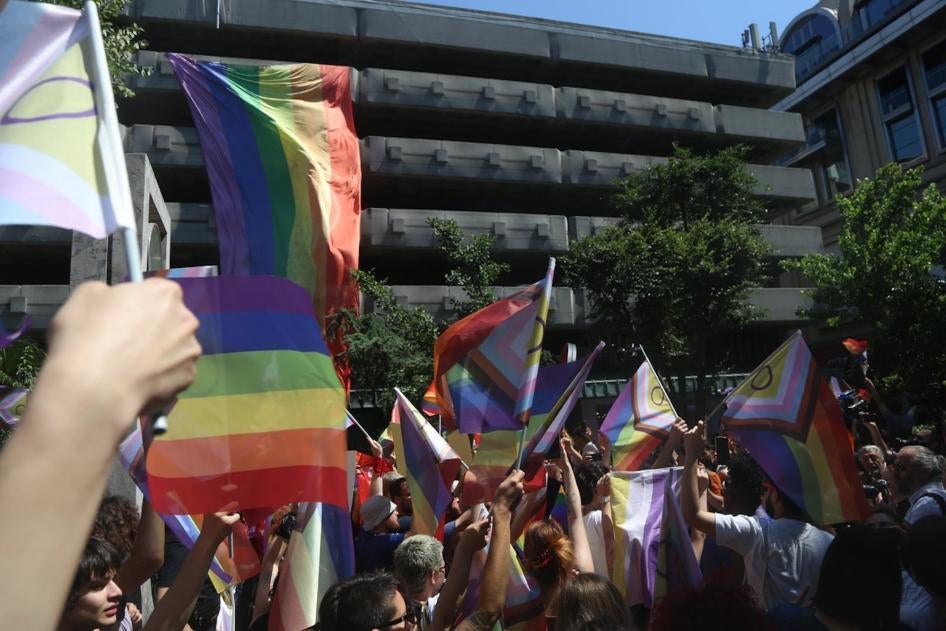(Istanbul, June 27, 2023) – Istanbul police violently intervened and detained 113 people on June 25, 2023, as demonstrators made determined and creative efforts to hold the Istanbul Pride March, Human Rights Watch said today. The march was banned for the ninth consecutive year as were all other pride events in the city, with the Istanbul governor stating on social media that there would be no permission for events that "threaten [the] institution of the family." In the western city of Izmir where pride demonstrations were also banned, police detained at least 52 people. Those detained in both cities were released a few hours later except five foreigners, whose whereabouts was uncertain at the time of writing.
The bans also follow an intensification of hateful anti-lesbian, gay, bisexual and transgender (LGBT) discourse by officials around the May 2023 elections.
“Banning Pride celebrations and detaining people for attempting to march is a flagrant violation of the right to peaceful assembly and expression and further evidence of the Turkish government's vitriolic campaign against LGBT people,” said Hugh Williamson, Europe and Central Asia director at Human Rights Watch. “Turkey should stop detaining and prosecuting Pride demonstrators, and reaffirm their fundamental right to peaceful protest in line with Turkey’s international obligations and its own laws.”
While public authorities in Turkey have comprehensively banned Pride marches and Pride Week events across the country, recent judicial decisions have found that these decisions are unlawful. In the last three years, eight courts – in Istanbul, Ankara, İzmir, Mersin, and Adana – have ruled that the prohibition of Pride marches and Pride Week activities by public authorities without evidence and justification for the existence of a clear, concrete, and imminent danger constitutes a violation of Tukey’s Constitution and the European Convention on Human Rights. Human Rights Watch has reviewed these decisions.
However, because these rulings are issued long after the decisions to ban events, they come too late to ensure that LGBT people are able to excise their right to assembly. Moreover, public authorities disregard the courts’ rulings. In June, after a trial that lasted about two years, the regional court of appeal upheld the acquittal of 19 people who had been detained in the Istanbul Pride March in 2021 and prosecuted for holding an unauthorized assembly in violation of the law on assemblies and demonstrations (law no. 2911).
After the mass detention of 373 people attempting to assemble for an Istanbul Pride March in 2022, the Istanbul Prosecutor's Office issued a decision six months later not to prosecute them.
In March, the Committee of Ministers of the Council of Europe, which supervises the implementation of European Court of Human Rights (ECtHR) judgments, issued an interim decision on the Oya Ataman group of cases that concern Turkey’s restriction on the right to assembly. The committee examined over 70 applications to the ECtHR concerning disproportionate interference in assemblies and demonstrations in Turkey over a period of more than 15 years and ordered the government of Turkey to guarantee the right to assembly by amending law 2911 to bring it into alignment the case law of the European Court.
The bans on Pride and related LGBT assemblies are consistent with the pattern of discriminatory statements against LGBT people by the government of President Recep Tayyip Erdoğan. Recently, the government suggested that it may seek to amend Turkey’s Constitution by introducing language asserting that marriage is based solely on the union of a man and woman, protecting the family from “threats,” and thus opening the way to further moves against associations upholding the rights of LGBT people.
Ahead of the 2023 presidential and parliamentary elections, discriminatory statements against LGBT people became one of the main themes of President Erdoğan’s election campaign. At many rallies, President Erdoğan used the words “These are LGBTers,” to refer to the opposition parties while Fatih Erbakan, the leader of the Islamist Yeniden Refah Party (New Welfare Party), aligned with the Erdogan campaign, pledged to close down LGBT associations in a speech on Turkish state television on May 7. In his election victory speech on May 28, Erdogan again targeted LGBT people and has continued to do so in subsequent speeches. On June 21, he referred to LGBT people as the “calamity that threatens the survival of our society.”
Despite repeatedly being accused by Erdogan of supporting LGBT people, the opposition alliance of six parties has not mentioned LGBT rights, including the right to peaceful assembly.
“Both the European Court of Human Rights and Turkey’s own courts have ordered the government to guarantee the right to assembly,” Williamson said. “Bans on Pride marches and events and police intervention are nothing more than unlawful intimidation tactics aimed at dissuading people from exercising their right to peaceful assembly.”








